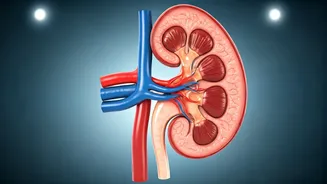Early Morning Swelling
One of the earliest indicators of potential kidney issues is the appearance of swelling, especially in the mornings. This swelling is often most noticeable
around the eyes, face, and ankles. This puffiness occurs because the kidneys are not properly filtering fluids, causing them to accumulate in various parts of the body. When kidneys are functioning well, they efficiently filter waste and excess fluids, preventing such swelling. However, if the kidneys are damaged or not functioning correctly, they struggle to manage the fluid balance, which leads to swelling. Regularly monitoring for this type of swelling, especially if it happens consistently, can be a crucial step in identifying early problems with your kidneys. If you experience this symptom, consult a healthcare provider for an evaluation.
Changes in Urination
Another vital sign of potential kidney problems can be found in changes related to urination. These changes can manifest in various ways, like an increased or decreased frequency of urination. You might find yourself needing to urinate much more often than usual, especially during the night, a condition known as nocturia. Alternatively, you might urinate far less frequently, possibly due to a reduced kidney function. The color of your urine might also change, possibly becoming darker, or even containing blood. Changes in urination may indicate issues in the kidneys, such as damage or diseases that affect their ability to filter and process fluids correctly. Recognizing and reporting any such alterations to a doctor immediately is crucial for prompt diagnosis and timely intervention. These issues require investigation to identify the underlying cause and determine the right course of treatment.
Fatigue and Weakness
Persistent tiredness and an overall feeling of weakness can often be early signs of kidney disease. The kidneys play an essential role in producing erythropoietin, a hormone that stimulates red blood cell production. When the kidneys are damaged, they may not produce enough erythropoietin, which can lead to anemia. Anemia, in turn, can cause fatigue, weakness, and overall feeling of being unwell. Moreover, as kidney function declines, toxins and waste products can build up in the body. These toxins can add to the feeling of fatigue and contribute to other symptoms. If you find yourself consistently feeling exhausted, even after getting enough rest, it is wise to consult a healthcare provider. They will evaluate your symptoms, possibly conduct blood tests, and check your kidney function to determine if there is an underlying issue that needs to be addressed.
Skin Issues and Rashes
Kidney problems can manifest in several ways on the skin. One of the common symptoms is the development of skin rashes and persistent itching. The kidneys eliminate waste products from the blood, but when the kidneys are impaired, these waste products can build up in the body. This buildup can lead to skin issues, including rashes, dryness, and intense itching. The skin may appear dry, and the itching can be unrelenting, causing significant discomfort. These symptoms can be particularly bothersome and affect your sleep and quality of life. The skin issues are often a sign of an underlying kidney condition. Therefore, if you experience skin changes like persistent itching or rashes, especially alongside other symptoms, it is essential to consult a doctor. They can perform necessary tests to assess your kidney function and determine the cause of the skin problems.
Nausea and Vomiting
Kidney problems can also cause gastrointestinal symptoms, such as nausea and vomiting. When the kidneys fail to function properly, waste products and toxins can accumulate in the bloodstream, leading to a condition called uremia. Uremia causes multiple symptoms that can affect various parts of the body. The accumulated toxins can irritate the digestive system and cause feelings of nausea, which can progress to vomiting. Individuals with chronic kidney disease may experience these symptoms more frequently as the disease progresses and kidney function deteriorates. If you frequently experience nausea and vomiting, especially along with other symptoms like fatigue, swelling, or changes in urination, it is crucial to consult a healthcare provider. They can assess your kidney function, diagnose the underlying cause, and suggest appropriate treatment and management strategies to alleviate symptoms.
Changes in Appetite
Another potential sign of kidney problems is a change in appetite, including a general lack of desire to eat. As kidney function declines, the buildup of waste products in the body can directly affect your appetite, making food less appealing. People may find that food has a metallic taste, or they may experience a general feeling of fullness, even if they have not eaten much. These shifts in appetite can lead to weight loss and nutritional deficiencies. If you notice a persistent reduction in your appetite, particularly when coupled with other symptoms like fatigue or changes in urination, it is important to consult a healthcare professional. They will conduct a thorough examination to determine the cause of your decreased appetite and kidney function, as well as recommend appropriate treatment or dietary adjustments to maintain your nutritional health.














